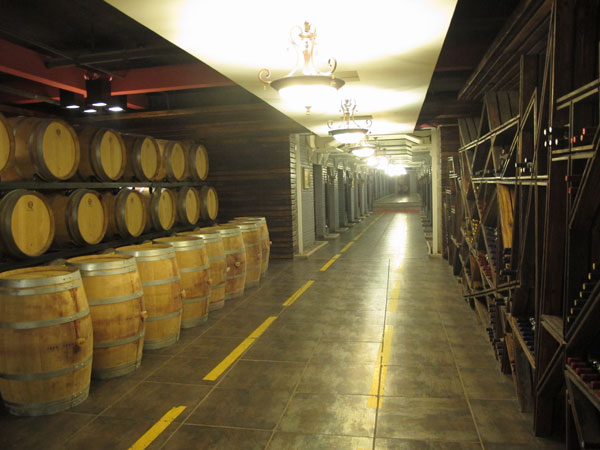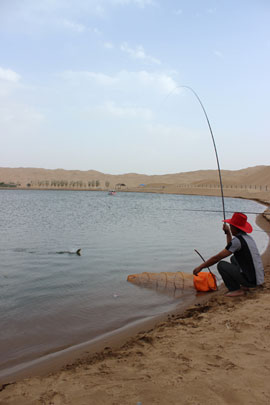Desert oasis
Updated: 2013-06-13 03:21
By Wang Kaihao (China Daily)
|
||||||||
|
 |
|
The underground cellar of Chateau Hansen is home to some of the city’s best wines. Wang Kaihao / China Daily |
The city boasts many different cultures, and Mongolian traditions only make up a small part of Wuhai's rich cultural mix. Migrants transplant customs from their homelands here. Ballads and music from different regions throughout the country can be found in the city.
It is greatly beneficial for me, because I am able to enjoy different styles of food within a couple of days.
|
 |
|
A local man pulls his catch out of the lake in Jinshawan, a popular tourist site in Wuhai. Wang Kaihao / China Daily |
However, no matter which cultural background locals come from, they share an affection for one important thing: wine.
Wuhai's climate is ideal for growing grapes. Many migrants brought grape seedlings when they moved to the area, and a grape trellis was a must-have in local backyards in the 1960s and '70s.
After a short trip to the newly built Wuhai Wine Museum — a three-story building in the shape of a grape — I go to the Chateau Hansen vineyard in the north of the city.
Cabernet Sauvignon, Cabernet Franc and Merlot are major varieties, but they are combined with some local breeds to better handle the sandy soil.
On a scorching summer day, it is relaxing to wander around the underground wine cellar and taste some local specialties.
Hundreds of oak barrels imported from France contain not only fine wine, but also the collective memory of the people of Wuhai.
I am an amateur drinker, but I cannot help taking just one more sip.
After trying these top-tier wine, I decide to look for the best fish in town.
The Yellow River provides Wuhai with abundant fresh fish, which is uncommon in China's Northwestern cities.
I have a surprising discovery on the way to a fishing village by the river.

 'Taken 2' grabs movie box office crown
'Taken 2' grabs movie box office crown
 Rihanna's 'Diamonds' tops UK pop chart
Rihanna's 'Diamonds' tops UK pop chart
 Fans get look at vintage Rolling Stones
Fans get look at vintage Rolling Stones
 Celebrities attend Power of Women event
Celebrities attend Power of Women event
 Ang Lee breaks 'every rule' to make unlikely new Life of Pi film
Ang Lee breaks 'every rule' to make unlikely new Life of Pi film
 Rihanna almost thrown out of nightclub
Rihanna almost thrown out of nightclub
 'Dark Knight' wins weekend box office
'Dark Knight' wins weekend box office
 'Total Recall' stars gather in Beverly Hills
'Total Recall' stars gather in Beverly Hills
Most Viewed
Editor's Picks

|

|

|

|

|

|
Today's Top News
Shenzhou X astronaut gives lecture today
US told to reassess duties on Chinese paper
Chinese seek greater share of satellite market
Russia rejects Obama's nuke cut proposal
US immigration bill sees Senate breakthrough
Brazilian cities revoke fare hikes
Moody's warns on China's local govt debt
Air quality in major cities drops in May
US Weekly

|

|








